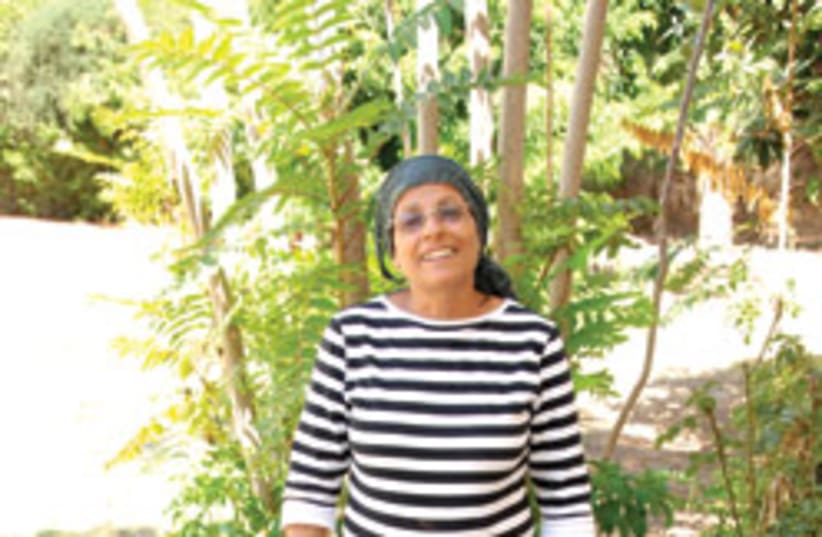I arrive early for my meeting with Zahava Shimon and wait in her cluttered kitchen/living room for her to come home. She's been at work all morning, cleaning houses, a job she has been doing for 46 years, since she left school at 11 to help her mother.
'People think that Ra'anana is full of only rich people, but actually there is a huge problem of poverty among the families that were born here,' Shimon points out.Photo: Gloria Deutsch
The sound of a motor scooter roaring to a standstill outside the ground-floor window announces the imminent entrance of Zahava. A tiny woman, her face obscured by a huge helmet, comes through the front door of the old apartment where she lives with her husband and two of her children.
She's a familiar figure in Ra'anana where she lives - the scooter is her method of transport for doing what she does best - collecting leftover food from institutions like day-care centers for children and redistributing it to the poor, something she has been doing, entirely on her own initiative, for 20 years.
"People think that Ra'anana is full of only rich people, but actually there is a huge problem of poverty among the families that were born here. Yes, there's been a large influx of wealthy people, especially in the last 15 years - French, Russians and, of course, many Anglos - but in the old neighborhoods like Migdal, the original families are having a very hard time.
"You feel it especially in the schools where there is so much competition - who has the nicest school bag, who wears the fanciest clothes, who can afford private tutoring. I felt it with my children when they were young and suffered humiliation, and I begged the authorities to introduce a uniform. To this day they haven't done it."
SHE BEGAN her activities on a small scale, making more than she needed for her own family so she could give to the needy people living near her.
"People, especially the religious, were ashamed to take handouts and admit they didn't have food," she says. "But I came in as a friend, not an organization, and they could accept that.
"Even if there's a car parked outside, I can tell if there's a need. Cars are legs nowadays. I still cook for people with disabilities, for the very old and for those who simply won't have if I don't bring it."
She works every day as a cleaner and when she finishes, at 2, she sets off on her scooter to collect what's left in six of the kindergartens around town. She gets rice, couscous, pasta, schnitzels and hamburger, although sometimes there's no meat left.
The food is kept in several refrigerators in the back of her apartment, on land which is not her private property, a fact which has led some of the neighbors to object and even sue her. Besides the refrigerators there are long tables where volunteers know they can bring bags of clothing, and greengrocers leave leftover stock on Fridays.
"But I only give out good quality things," she emphasizes. "If the fruit and vegetables are rotten, it goes to farms for the horses. Nothing is wasted."
SHIMON IS one of seven children, born to a Yemenite mother and father who arrived here in 1949 on Operation Magic Carpet.
"They came with one baby who was stolen on the way," she says matter-of-factly. "Would I like to trace my brother? How can I, we have no clues as to what happened to him."
Her father worked in the orchards, her mother went out cleaning. Her education began in first grade at age six, and ended five years later when she went to clean steps and wash out garbage bins to help her mother.
To my amazement, halfway through our interview Shimon began speaking in perfect but accented English. She learned it, she says, from working in so many Anglo houses over the years. She is even trying to learn to read and write it in the little spare time she has. If she had been able to have an education, she would have been a social worker.
She has an army of volunteers who help her and also is in contact with Table to Table and Ezer Mitzion, nonprofits which do similar work. Some of her volunteers are themselves needy and help distribute the food, then take for themselves. She takes a motherly interest in her volunteers, and keeps a list of their birthdays so that each one gets a small celebration and a home-baked cake. And once a year she makes a party for them all.
"It gives me great satisfaction that I can give and no one goes hungry," she says. "It's good for the soul."
